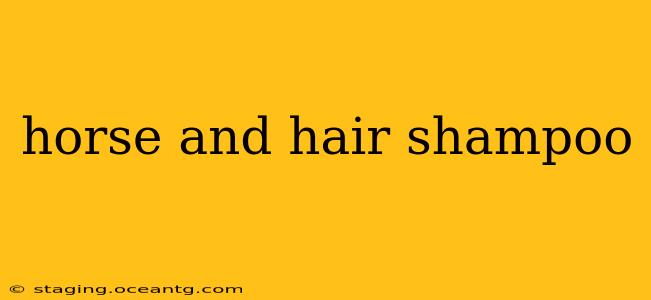Choosing the right shampoo is crucial, whether you're grooming your beloved horse or tending to your own hair. While seemingly disparate, the world of equine and human hair care shares some surprising similarities and significant differences. This comprehensive guide delves into the unique needs of both horse and human hair, exploring the best shampoo options for each.
What Makes Horse Hair Different from Human Hair?
Horse hair, unlike human hair, is significantly coarser and thicker. It's also much more prone to accumulating dirt, sweat, and other debris due to its length and exposure to the elements. Furthermore, the protective outer layer of the horse's hair (the cuticle) is different, impacting how it responds to different shampoos. Human hair, on the other hand, varies greatly in texture and thickness, depending on genetics and individual care practices. This difference in structure dictates the type of shampoo best suited for each.
What Kind of Shampoo Should I Use on My Horse?
Choosing a shampoo for your horse is critical to maintaining a healthy coat. Avoid using human shampoos, as they often contain ingredients that can strip the horse's coat of its natural oils, leading to dryness and irritation. Opt for shampoos specifically formulated for horses, which are typically pH-balanced to respect the horse's skin and coat. These shampoos often contain ingredients designed to remove dirt, sweat, and other impurities without harsh chemicals. Look for shampoos that are:
- Gentle: Avoid harsh detergents and sulfates.
- pH-balanced: This ensures the shampoo won't disrupt the horse's skin's natural balance.
- Specifically formulated for horses: This guarantees the shampoo is tailored to the unique needs of equine hair.
Many equine shampoos also offer added benefits, such as those containing conditioning agents to add shine or medicated shampoos to treat specific skin conditions. Always consult with your veterinarian if your horse has any skin issues.
What are the common ingredients in horse shampoo?
Common ingredients in horse shampoos include gentle cleansers, conditioners like lanolin or aloe vera, and sometimes added treatments for specific skin conditions. Always read the label carefully to understand what's in the shampoo and whether it suits your horse's needs.
Can I use human shampoo on my horse?
While tempting due to convenience, it's generally advised against using human shampoo on horses. Human shampoos are formulated for human hair and scalp pH, which differs significantly from that of a horse. Using human shampoo can strip the horse's coat of essential oils, leaving it dry, brittle, and prone to irritation.
Choosing the Right Shampoo for Human Hair: A Guide
The vast array of human shampoos available can be overwhelming. The best shampoo for you depends on your hair type (e.g., oily, dry, fine, thick, color-treated) and concerns (e.g., dandruff, hair loss). Consider these factors:
- Hair type: Oily hair needs a clarifying shampoo, while dry hair benefits from moisturizing formulas.
- Hair concerns: Specific shampoos target dandruff, hair loss, or color protection.
- Ingredients: Look for shampoos with natural ingredients and avoid harsh sulfates and parabens.
Remember to always read the product label carefully to understand the ingredients and their intended effects.
What are the different types of human shampoos?
The market offers a wide variety catering to specific needs. These include clarifying shampoos for oily hair, moisturizing shampoos for dry hair, volumizing shampoos for fine hair, and color-protecting shampoos for dyed hair.
How often should I wash my hair?
The frequency of hair washing depends on your hair type and lifestyle. Oily hair may need daily washing, while dry hair might benefit from washing every 2-3 days.
Conclusion: Tailored Care for Healthy Hair
Whether you're caring for a horse's magnificent mane or your own tresses, choosing the right shampoo is essential for maintaining healthy, vibrant hair. By understanding the unique needs of both equine and human hair, and selecting appropriate shampoos, you can ensure your horse and your own hair look and feel their best. Remember to always prioritize gentle, pH-balanced formulas and address any specific concerns through specialized products or professional consultation.
